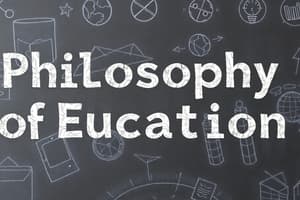Podcast
Questions and Answers
What is the philosophy of education?
What is the philosophy of education?
A branch of philosophy that addresses philosophical questions concerning the nature, aims, and problems of education.
Educational theories are random ideas that do not have any structured principles.
Educational theories are random ideas that do not have any structured principles.
False (B)
Which of the following is NOT a teaching approach in the K to 12 Curriculum?
Which of the following is NOT a teaching approach in the K to 12 Curriculum?
- Behavioral Management (correct)
- Inclusive Education for all
- Research-based
- Learner-centered
Match the teaching methods with their descriptions:
Match the teaching methods with their descriptions:
What is meant by metacognition?
What is meant by metacognition?
The process of bringing the learner to think about their own ways of learning is known as __________.
The process of bringing the learner to think about their own ways of learning is known as __________.
Which of the following best describes the role of teaching strategies?
Which of the following best describes the role of teaching strategies?
Which teaching method starts from specific instances and moves to general conclusions?
Which teaching method starts from specific instances and moves to general conclusions?
What are the steps involved in the Explicit Instruction teaching strategy?
What are the steps involved in the Explicit Instruction teaching strategy?
Which teaching technique might a teacher use to manage distractions in the classroom?
Which teaching technique might a teacher use to manage distractions in the classroom?
Which option is NOT considered a teaching strategy?
Which option is NOT considered a teaching strategy?
In the 5 E's of Learning model, what is the initial stage of the learning process?
In the 5 E's of Learning model, what is the initial stage of the learning process?
What is a key characteristic of a learner-centered approach in education?
What is a key characteristic of a learner-centered approach in education?
Which teaching approach focuses on adapting lessons to respect various cultures?
Which teaching approach focuses on adapting lessons to respect various cultures?
Which of the following approaches encourages students to generate their own questions?
Which of the following approaches encourages students to generate their own questions?
What does a constructivist approach emphasize in the classroom?
What does a constructivist approach emphasize in the classroom?
How does the mother tongue-based MLE approach enhance learning?
How does the mother tongue-based MLE approach enhance learning?
Flashcards are hidden until you start studying
Study Notes
Philosophy of Education
- Addresses philosophical questions about education's nature, aims, and issues.
- Combines various educational theories that offer principles for educators.
Educational Theories
- Established frameworks guiding educational practice.
- Offer insights into how education can be structured for maximum effectiveness.
Piaget's Cognitive Development
- Focuses on how children understand the world through stages of cognitive growth.
Gardner's Multiple Intelligences Theory
- Proposes that individuals have different kinds of intelligences, broadening the understanding of student capabilities.
Teaching Approaches in K to 12 Curriculum
-
Learner-centered: Emphasizes student engagement and lifelong learning.
Inclusive Education:. Ensures no student is excluded from learning opportunities
-
Developmentally Appropriate: Tailors learning tasks to students' developmental stages.
-
Responsive and Relevant: Connects learning to students' real-life experiences.
-
Culture-sensitive: Respects and incorporates student cultural backgrounds.
-
Contextualized and Global: Aligns learning with local and worldwide contexts.
-
Research-based: Incorporates findings from educational research into teaching.
-
Constructivist Approach: Encourages students to build knowledge based on prior experiences.
-
Inquiry-based: Focuses on student-generated questions to drive inquiry and discovery.
-
Reflective Teaching: Teachers assess and think critically about their teaching practices.
-
Collaborative: Promotes teamwork and group discussions.
-
Integrative: Combines different subjects and disciplines into cohesive learning experiences.
-
Mother Tongue-Based MLE: Utilizes students' native languages to support learning.
-
Metacognitive Approach: Encourages students to reflect on their own thinking processes.
Teaching Methods
- Inductive & Deductive: Inductive moves from specific to general, while deductive does the opposite.
- Structured Steps: Includes preliminaries, presentation, generalization, and assessment.
- Common methods: Lecture, explicit instruction, and the 5 E’s of learning (Engage, Explore, Explain, Elaborate, Evaluate).
Teaching Strategies
- Plan to achieve specific educational goals, detailing each step of the teaching method.
- Examples include explicit instruction using a microscope, applying I do/We do/You do structure.
Effective Teaching Techniques
- Defines a teacher’s unique style or strategies for classroom management and engagement.
- Common techniques: Attendance checks, managing distractions, and organized student groupings.
- Establishes systems of rewards and punishments for classroom management.
Metacognition (John Flavell, 1979)
- Involves understanding one’s own learning processes, enhancing self-regulated learning capabilities.
Strategies for Active Learning
- TQLR: Tune in, Question, Listen, Remember.
- PQRRRR: Preview, Question, Read, Recite, Review, Reflect.
Research Application
- Analyze research related to metacognition, focusing on problems, methodology, findings, and conclusions for informed recommendations.
Philosophy of Education
- Explores questions about the nature, aims, and challenges in education.
- Grounded in philosophical analysis and thought.
Educational Theories
- Comprise principles and recommendations designed for educational practice.
- Serve to guide educators in their teaching methodologies.
Cognitive Development Theories
- Piaget's theory emphasizes stages of cognitive growth in children, influencing teaching strategies.
- Gardner's Multiple Intelligences Theory proposes various types of intelligence beyond traditional academic metrics.
Teaching Approaches in K to 12 Curriculum
- Learner-Centered: Focuses on the needs and interests of students, fostering lifelong learning.
- Inclusive Education: Aims for equitable access to education for all, prioritizing inclusivity.
- Developmentally Appropriate: Ensures tasks are aligned with students' cognitive and emotional growth stages.
- Responsive and Relevant: Teaching content is connected to students' real-life experiences.
- Culture-Sensitive: Respects and integrates diverse cultural backgrounds into learning.
- Contextualized and Global: Relates learning to both local contexts and global issues.
- Research-Based: Grounded in educational research to enhance learning effectiveness.
- Constructivist Approach: Encourages students to build knowledge based on prior experiences.
- Inquiry-Based Learning: Driven by student questions, exploring learning through discovery.
- Reflective Teaching: Involves conscious contemplation by teachers regarding their instructional practices.
- Collaborative: Promotes group work, encouraging teamwork and discussion.
- Integrative Approach: Links various subjects or concepts to provide a cohesive learning experience.
- Mother Tongue-Based MLE: Utilizes students' native language in the learning process.
- Metacognitive Approach: Involves learners reflecting on their own thought processes and learning strategies.
Teaching Method
- Involves systematic, sequential steps for effective instruction.
- Includes both inductive methods (specific to general) and deductive methods (general to specific).
Key Components of Teaching Methods
- Preliminaries: Prepare students with reviews and motivations.
- Procedure: Includes presentation, concept formation, and activities.
- Generalization: Summarizes key learnings.
- Assessment: Evaluates student understanding.
Common Teaching Methods
- Lecture and Explicit Instruction (I do, We do, You do).
- 5 E's of Learning: Engage, Explore, Explain, Elaborate, Evaluate.
Teaching Strategies
- Methodical approaches to executing teaching tasks effectively.
- Requires planning for each step in the teaching method.
- Example: Explicit Instruction breaks down the lesson into phases of introduction, practice, and independent work.
Examples of Teaching Strategies
- Field Trips: Real-world learning experiences outside the classroom.
- Role Play: Encourages experiential learning through simulations.
- Debate: Fosters critical thinking and argumentation skills.
- Think-Pair-Share: Promotes collaborative thinking and problem-solving.
- Jigsaw Puzzle: Group activity that encourages collaborative learning among different groups.
Teaching Techniques
- Personal styles or methods adopted by teachers for classroom effectiveness.
- Practical implementations that enhance student engagement and management.
- Techniques may include behavior management strategies like rewards and consequences, attendance checks, or quick attention diversions.
Studying That Suits You
Use AI to generate personalized quizzes and flashcards to suit your learning preferences.




